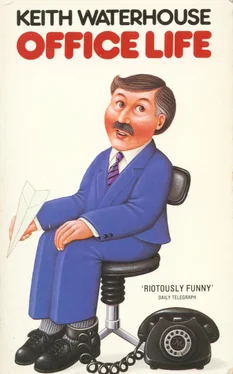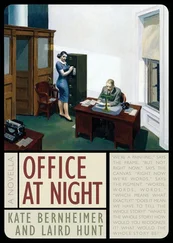'Dear Sir, I was a clerk in your employ from March 1968 until 1971, resigning in August of that year to take up a position with Messrs Hardacre and Prentice in order to be nearer my home, and subsequently obtaining a position as Senior Sales Clerk with Messrs Comform. Reference may be made to your Mr Cottingley, to whom I spoke telephonically this morning and who informs me that a vacancy might shortly occur in the Contracts Dept… '
He had never been in a Labour Exchange in his life, regarding such institutions with the same mixture of disdain and horror as Victorian clerks secure in their counting-houses must have viewed the parish workhouse. Even though he understood they were now called employment exchanges and that you no longer had to join a shuffling queue in an olive-green painted corridor, he felt dispirited and degraded at having to consider this approach. He was a little vague about what the drill was and feared that once he had signed up they might have the power to direct him into a factory.
He was relieved to find that his local employment exchange had enjoyed yet another transformation and was now called a Job Centre, with attractive premises in the main shopping street that could well have been taken for an Electricity Board showroom or one of those commercial temps bureaux for audio-typists. Instead of being questioned by a severe-looking person at a linoleum-covered counter or worse still behind a grille of some kind, he was directed by an air hostess type of girl to a kind of wall newspaper with pages of orange painted pegboard, where jobs were advertised on pieces of white card. There seemed to be opportunities in plenty for senior clerks, but as there were other men studying the advertisements, all of whom had to be considered as potential rivals, Gryce allowed himself no time for browsing. He memorized the reference number of the first senior clerk's vacancy on which his eyes focussed — The British Albion Group requires senior clerical personnel with experience in voucher-processing and/or card-filing systems — and crossed to the reception desk where another air hostess type punched some buttons on an electronic scanner, gave him a questionnaire to fill out, and told him to report for an interview at 11.30 on Friday week.
British Albion was in Gravechurch Street, one of the main thoroughfares leading west out of the City. Gryce got there an hour early and sat on a low circular wall surrounding a largish area of recently-laid grass sods where some old commercial building must have been at one time. It served to set off Albion House opposite, and to give light to its lower storeys. He could imagine that the British Albion typists sunbathed out here in the summer. If they did, it might be pleasant to start bringing sandwiches to work, he'd never felt inclined to do that in his previous billets because there had never been anywhere to sit. That would be one advantage.
Albion House did not seem to make the best use of the space available to it. Although it was twelve storeys high it was a very thin-looking building, with the same area again squandered on a pebbledash forecourt boundaried by a low chain fence. Not that Gryce himself was a motorist, but he called that a waste of a good car-park. Again, the potential breadth of the glass tower was truncated by a kind of annexe affair jutting out of the second and third floors and supported on concrete stilts. The managerial suite, he supposed. That would be where he would be interviewed.
Gryce looked at his watch. He had fifty minutes to waste. Perhaps he could go and have a drink or a cup of tea while killing time — more likely a cup of tea, since he wouldn't want to go in smelling of beer. But pottering around the area for a quarter of an hour or so he could find nowhere — a distinct inconvenience, he called it. There were some temporary-looking shops on a demolition site — a health food bar, a greetings card shop, and that was about it.
He had known these streets when he was an office boy in his first billet, but of course there had been wholesale redevelopment since those days. He seemed to remember a sandwich bar on this corner, and a pub on that, and an ABC teashop, and some little back street cafes where you could get bacon and eggs style of thing. All those buildings had been pulled down now. There were new office blocks in plenty but the commercial bustle of the area had gone completely. The offices were prestige affairs these days, no longer served by labyrinths of workshops and warehouses in lanes and alleys behind their impressive frontages. No trade counter round the back of any of these places, he would like to bet. No loading bays with parcels bouncing along noisy metal rollers. No fleet of vans in the cobbled yard: no cobbled yards. If you wanted two gross of whatever it was they sold, it would be a question of telexing a brick-built despatch centre out in the fields of Essex. Dispersement, they called it. Not that he disapproved of that kind of policy, it meant more paperwork all round.
Gryce wandered on. The tall office blocks gave way to older buildings: sets of Victorian chambers with the plastic fascias of secretarial agencies and photo-copying bureaux slung across their vaulted doorways; old-established banks and insurance companies with bright new logotypes, boxed in illuminated glass, to supplement their chaste brass plates; and the warehouses that Gryce remembered from his younger days. Although they were warehouses no longer in the classic sense — they had mostly been broken up into warrens of small stock-rooms for the kind of goods like soft toys and dressing-table sets you would expect to see on market stalls, and one of them was converted into a wine bar called the Pressings — it made Gryce feel quite nostalgic to see them.
He remembered his days at the Docks and Inland Waterways, when the smell of coffee and spices wafted in from the bonded warehouses nearby. It was a very happy billet. His duties were light and he had got into the habit of sauntering about the building each afternoon exchanging a word with particular colleagues. One of them always wanted help with his Daily Mirror crossword, another was taking driving lessons and liked to be tested on the Highway Code. That was always an occasion for joshing. Peggy worked in the typing pool and he always contrived to arrive there at tea-time. He was in his early twenties and the world had seemed full of promise.
Fearful of being late, Gryce retraced his steps to the low wall opposite British Albion. Apart from the Pressings wine bar, not the kind of place he would want to use on a regular basis, he had found nowhere to eat or drink in the event that he got the job and didn't bring sandwiches. He would have to find out if there was a staff canteen. There must be, in a place that size.
Gryce passed through the revolving doors of Albion House at twenty-six minutes past eleven. The reception area took up the entire ground floor, which was usual enough in many of the offices he had worked in: but where you would expect some display of the company's products — a cross-section of some industrial machinery, say, on a revolving plinth — and probably an occasional table with a selection of the firm's promotional literature, British Albion offered only an artificial rock pool and some plants in tubs. This was a prestige office right enough.
Three uniformed commissionaires manned the long reception counter. Gryce approached the nearest of them, a man with one arm, and stated his name and business.
'Gryce,' repeated the commissionaire. 'You got a Gryce there, Douglas?'
The second commissionaire, who also had one arm, did not immediately react in any way. He was gazing towards the revolving doors in an intense manner and could conceivably have been counting the pale blue tiles of the wall that framed them. After some time he picked up a card and examined it through spectacles the thickness of bottle-glass. Distorting his mouth and breathing out heavily, as if expelling Woodbine smoke, he confirmed that Gryce had an appointment with Personnel.
Читать дальше












